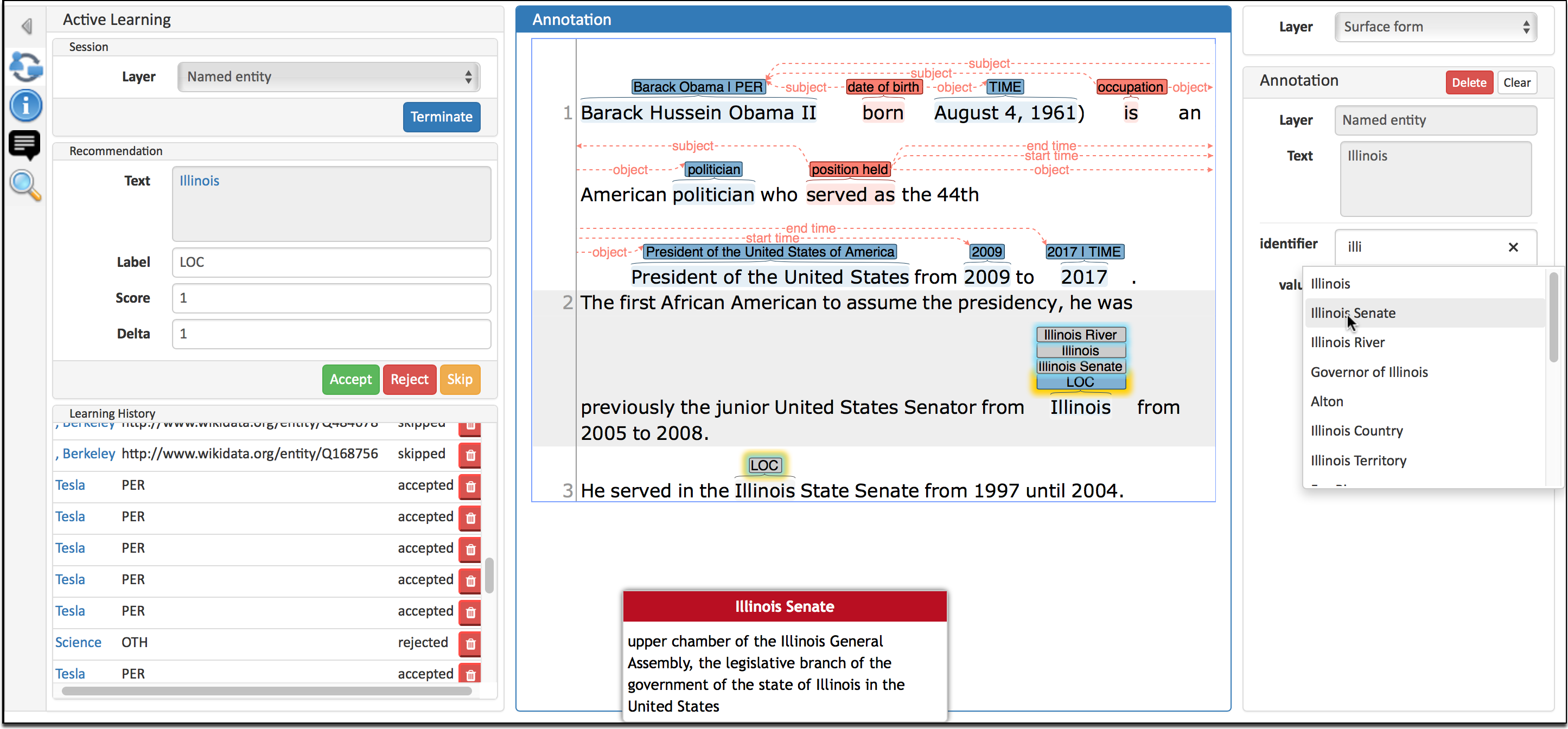INCEpTION provides a semantic annotation platform offering intelligent annotation assistance and knowledge management. For more information, visit the INCEpTION website. For a first impression on what INCEpTION is, you may want to watch our introduction videos.
INCEpTION is a text-annotation environment useful for various kinds of annotation tasks on written text. Annotations are usually used for linguistic and/or machine learning concerns. INCEpTION is a web application in which several users can work on the same annotation project, and it can contain several annotation projects at a time. It provides a recommender system that suggest potential annotations to help you create annotations faster and easier. Beyond annotating, you can also create a corpus by searching an external document repository and adding documents. Moreover, you can use knowledge bases, e.g. for tasks like entity linking.
The best way to get started is to watch our tutorial videos, working through the Getting Started Guide and playing with INCEpTION on the demo server.
- User Guide: If you only use INCEpTION and do not develop it, the User Guide beginning right after Getting Started is the guide of your choice. If it does not answer your questions, don’t hesitate to contact us (see Do you have questions or feedback?).
- Admin Guide: For information on how to set up INCEpTION for a group of users on a server and more installation details, see the Admin Guide.
- Developer Guide: INCEpTION is open source. So if you would like to develop for it, the Developer Guide might be interesting for you.
Many more materials like example projects , use case descriptions and helpful scripts are available via the INCEpTION homepage.
We also offer several Jupyter Notebooks which describe how you can interact in Python with INCEpTION, prepare or post-process annotations:
Export annotations as one sentence per line
Use pre-tokenized and pre-annotated documents in INCEpTION
Convert Word files to CAS XMI for import into INCEpTION
Working with INCEpTION slot features in DKPro Cassis
- ... more Python examples
INCEpTION is still in development, so you are welcome to give us feedback and tell us your wishes and requirements.
- For many questions, you find answers in the main documentation: Core Functionalities.
- Consider our Google group inception-users
- You can also open an issue on Github.
Please use the following citation:
@inproceedings{klie-etal-2018-inception,
title = "The {INCE}p{TION} Platform: Machine-Assisted and Knowledge-Oriented Interactive Annotation",
author = "Klie, Jan-Christoph and Bugert, Michael and Boullosa, Beto and Eckart de Castilho, Richard and Gurevych, Iryna",
booktitle = "Proceedings of the 27th International Conference on Computational Linguistics: System Demonstrations",
year = "2018",
address = "Santa Fe, New Mexico",
url = "https://www.aclweb.org/anthology/C18-2002",
pages = "5--9"
}
Do you miss a feature? We very much appreciate your contribution! Please open an issue before sending a pull request. INCEpTION uses the DKPro Contribution Guidelines.
- Create a fork
- Create your feature branch:
git checkout -b my-feature - Commit your changes:
git commit -am 'Add some feature' - Push to the branch:
git push origin my-new-feature - Submit a pull request 🚀
INCEpTION is provided as open source under the Apache License v2.0.






